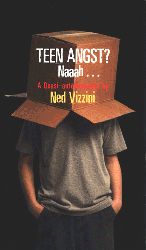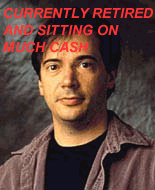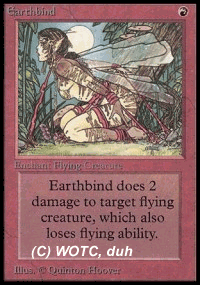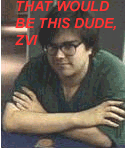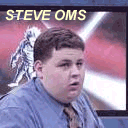|
|
|
|
|
|
|
|
|
|||
 |
||||||||||
|
|
|
|||||||||
 |
|
|||||||||
|
|
||||||||||
|
By Ned Vizzini Just one of a whole junk-load of stories found in my book, Teen Angst? Naaah…, which you can win a free copy of right here. psst: This is possibly the first nostalgilazation/romanticization of Magic in print. You know somebody had to do it…As the ten-year mark approaches, celebrate! Teenage boys are (1) many in number; (2) bored out of our minds. And we get tired of descrambled porno. So, in 1993, a California mathematician named Richard Garfield began selling a game called Magic: The Gathering.
You remember Dungeons and Dragons, the fantasy role-playing game, where you spend hours pretending you’re an elf or dwarf on an adventure? Magic’s like that, but it uses cards. Each player has a sixty-card deck, and each card depicts a troll, gnome, or some other Dungeons and Dragons-ish creature. [Many of these "creatures" are scantily clad, buxom females. In fact, some early Magic cards were banned from later editions because they were too sexually suggestive. The one I remember was Earthbind, which featured this teenage-looking elf tied down with leather straps.]
The players draw seven of these cards to make a hand; then they use this hand to attack each other [this was written prior to Prosp-Bloom/Academy], taking away life points with successful hits. Each player starts out with twenty life points; when someone hits zero, he dies. Game over. The rules get a lot more complicated. Just know that when you win a game of Magic, you get a sharp, semisexual thrill that makes you forget, briefly, that you’re a card-obsessed loser. I love the game, as do a staggering number of people—Magic is over a half-billion dollar industry. There are almost four thousand different types of cards printed in eight languages [and this was in 2000]. Tournaments are held in parents’ basements, commercialized gaming halls, convention centers, and very occasionally on ESPN2 or 3. There’s even an official Magic league—the DCI—and an annual Magic Pro Tour, where the game’s elite travel from continent to continent competing. It takes money to play Magic. The cards are sold in packs, like cigarettes, about $3.50 for fifteen. Those fifteen cards, however, aren’t random. Just as baseball cards have "rookies" and "all-stars," Magic packs contain eleven "commons" (virtually worthless cards), three "uncommons" (might be worth a buck or two), and one "rare" (the real goodies; some have double-digit price tags). Every few months an "expansion set" is released, containing a new group of cards with dozens of fresh rares for players to collect. Each expansion set has its own name and packaging so that a Magic player making a purchase sounds like a smoker, "Yeah, I’ll have a pack of ‘Legacy.’" I’m down to a pack a day. Magic also offers the chance to make money. Certain ultrarare cards are worth more than $300, and if you get your hands on them, there’s a world of collectors who will buy. Also, Magic tournaments sponsored by DCI offer cash prizes. Real cash. I know a kid who won $25,000 in the Magic Grand Prix in Japan. For years, the New York Magic "scene" has been dominated a single gaming hall: an oversized room full of tables called Neutral Ground. Occupying the entire fourth floor of 122 West Twenty-sixth Street, Neutral Ground is nerd heaven. At all hours of the day and night, you can enter the place and play Magic with people as addicted as you are. I used to attend Neutral Ground’s Friday tournaments about once a month. Fridays at the Ground were a trip. Hardcore gamers sat in stained T-shirts methodically opening packs of cards, while businessmen perused glass display cases, picking out $75 rares. The businessmen wore stylish coats and carried attaché cases, but as soon as they entered Neutral Ground, they were like little kids, gibbering about this and that card. The patrons ranged in age from twelve to fifty, but most were in their twenties, and everyone acted like teenagers. Occasionally, a girl would join the tournament, but the women who play magic are a wild and woolly lot: they either look and smell like train-hopping hoboes, or they’re with male Magic players, who value them more than anything on earth. Once, I spent all night at Neutral Ground. It wasn’t hard. I told my parents I was sleeping at James’s house. [James was my "friend of convenience." I think a lot of teenagers have one—the friend you tell your parents you're staying with when you're really doing something illicit. James was perfect because my mom knew his mom (so there was a degree of trust) but never really didn't talked to her that often (so there was little chance of getting caught).] I went into Manhattan at 6:30 P.M. I entered the Friday tourney at 7:30 and played until 12:30 A.M. (I lost), steadily consuming a supply of Nacho Doritos and Mountain Dew. I played with Tony, a twelve-year-old whose mom let him practically live at Neutral Ground. I tried to play with Steve O’Mahoney-Schwartz—the highest ranked Magic player on the East coast—but he spurned me. Out of my league.
Around 1:15 A.M., I started a "melee game"—a Magic game with more than two players. My opponents were a marine who kept telling the same joke about a woman in a tollbooth, a Rick Moranis look-alike half my height, and a pudgy guy who kept picking his ear. Our game began at 1:30, and Time, in a wacky, late-night trick I hadn’t seen before, jumped forward three hours. I looked down at my cards at 2:00 and glanced up to find it was 4:30. "Gotta go, guys," I told my opponents. They were doped up on Mountain Dew by then; they smiled and patted me on the back. I gathered up my things and staggered (my thighs had fallen asleep) onto Seventh Avenue. The birds were singing. Sunrise. The subways didn’t run so well at that hour. I had to wait twenty minutes for a train, but I got home okay. I ate breakfast at a diner at 5:45, watched the sky blue, and told the waitress I’d been out all night "looking for trouble." I went home around 6:45, slept for ten minutes, and got back on the train. It was Saturday morning, and I had to volunteer at my high school. Magic shaped up to be my adolescent pastime, the way video games were my childhood sport. I eased into conversations about it that sounded like gibberish to the everyone else. ("Ball Lightning is crap! It always gets Bolted or Incinerated or Black Knight-ed!") My mind slipped into thinking about Magic like hands under a pillow. See, at the cusp of puberty, I had to make a choice: Magic or girls. And, well, Magic was right there. You know? --ned Like it? Win a signed copy of my book, Teen Angst? Naaah…, for free (with about 30 more stories inside). Published by Random House. Your new favorite book of all time: Just provide me with dis info: Winners will be selected randomly based on how much crack your mom smokes.
|
|||||||||

